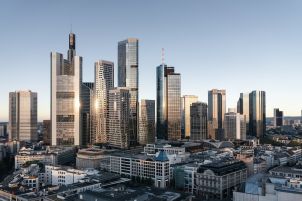For the first time ever in the UK, job vacancies outnumber unemployed people, with the unemployment rate falling to 3.7% between January and March 2022, the lowest it has been in 50 years. [i] This combined with the new cultural and social environment that we now find ourselves in has created an empowered set of office workers, capable of choosing the companies, and as such offices, which suit their needs.
This combination of factors has as such forced companies to rethink how their offices are designed and flexibility has become the foundation for this new drive. Most offices have now done away with fixed landlines, as employees have become accustomed to communicating through video conferencing technology or with a mobile phone. This simple shift has set in motion the idea that we no longer need an assigned desk on a specific floor to work efficiently. Indeed, at different times of the day we may wish to work in silence on a sofa tucked away in one part of the office and then later at a shared workstation where we can interact with colleagues and bounce ideas around. It is this idea of managing our time and desires at any one moment that has liberated many workers and which subsequently needs to be mirrored in the offices which they work in.
For numerous companies, flexible office space has become crucial to their future strategies, if indeed they haven’t already implemented it. Like BNP Paribas Real Estate’s headquarters METAL 57 in the outskirts of Paris, which was designed to be entirely flexible. With a variety of different working options from individual phone pods to large meeting rooms which can juggle in-person and virtual participants intuitively, the space is meant to fluidly interactions and cater to a one-size-doesn’t-fit-all way of working.
[i] https://www.bbc.com/news/uk-61475720
Well-being must be an integrated part of offices
Employees have still expressed their desire to come back to the office, for various reasons including the equipment that they are able to use at the office and the different services that they can access.
The services which are on offer at an office must now become better thought out. In an environment where our professional lives leak into our personal and vice versa, coming to the office can’t only be about turning up and sitting in front of a computer.
office must now become better thought out. In an environment where our professional lives leak into our personal and vice versa, coming to the office can’t only be about turning up and sitting in front of a computer.
A recent survey by Bupa found that a fifth of people now working from home are exercising less[1]. This is one of the reasons that the health and well-being lobby group ukactive is calling for a rethink of health initiatives within the workplace. Supported by Sport England and the Federation for Small Businesses (FSB) they have carried out a report to examine the state of the workplace in terms of health and well-being within small to medium businesses (SMEs). The report found that increased home and hybrid working are seen as barriers to physical activity and for 44.4% of the SMEs surveyed, they do not provide opportunities for employees to be active during working hours.
Offering employees access to schemes like Cycle to Work, providing an on-site gym, exercise classes or access to private leisure facilities through membership are therefore ways that the role of the office becomes concerned for the well-being of its occupants. Whether it’s how people get to the office or providing them with ways to be active whilst there, there is still much that can be done to adapt to a workforce that requires more.
It is not only physical well-being that can be cared for in the office but also mental. Actions such as social activities, organised workshops or training courses that bring people together are just some of the ways that coming to the office has added value. We know that one of the principal reasons that people want to come back to the office is to interact with colleagues and have time to socialise with them. Providing a wide range of services that cater for this is therefore becoming crucial in the design of an office. Space to take a break together, eat lunch in a group or have a quiet chat is becoming increasingly called upon and reinforces the importance of the office within our lives, and not only the professional part.
Design is crucial to how we feel in our offices
The office has changed a lot over time. From siloed-off individual offices to the large open space areas of the recent past, it’s ultimately stood the test of time. Now however we are increasingly interested in exactly how employees feel within an office environment. In a study by Kerstin Sailer, Professor at the Bartlett School of Architecture at University College London, four floors of a London technology company’s headquarters were observed. The idea was to study the differences in the open plan space as well as the experiences of workers. The ultimate finding was that satisfaction with the workspace varied greatly depending on where someone was sitting. For those sitting in front of a large number of desks or those with their backs to others, they reported a negative experience of teamwork, in comparison to those who faced into the room and those with less desks in front of them. Such aspects must as such be considered in our new flexible office space, as we create areas that different people can use in different ways and ultimately feel comfortable in.
O ther aspects such as noise, which many people find to be distracting can be combatted by adding soft furnishings such as rugs and sofas to both reduce noise and create a feeling of well-being that is driven by the aesthetic of the office.
ther aspects such as noise, which many people find to be distracting can be combatted by adding soft furnishings such as rugs and sofas to both reduce noise and create a feeling of well-being that is driven by the aesthetic of the office.
Much has changed over the last two years since we were knocked off kilter by the health pandemic. Now though, as we regain our balance, it’s clear that we’ve learnt a lot and come a long way. Yes, employees now require more services and a thought-out office building which caters to the blurred boundaries between their personal and professional lives, but ultimately this has meant that we are now thinking about offices in a way they have never been designed. This only demonstrates the importance of continually striving to understand how an office building can support employees and ensure that coming to the office continues to be seen as an important part of a new multi-faceted approach to work.




